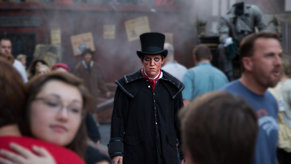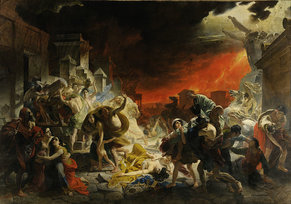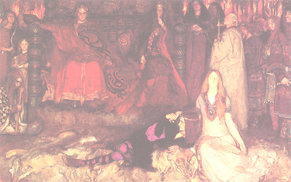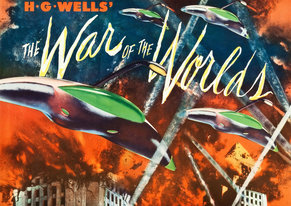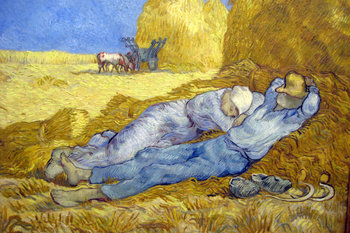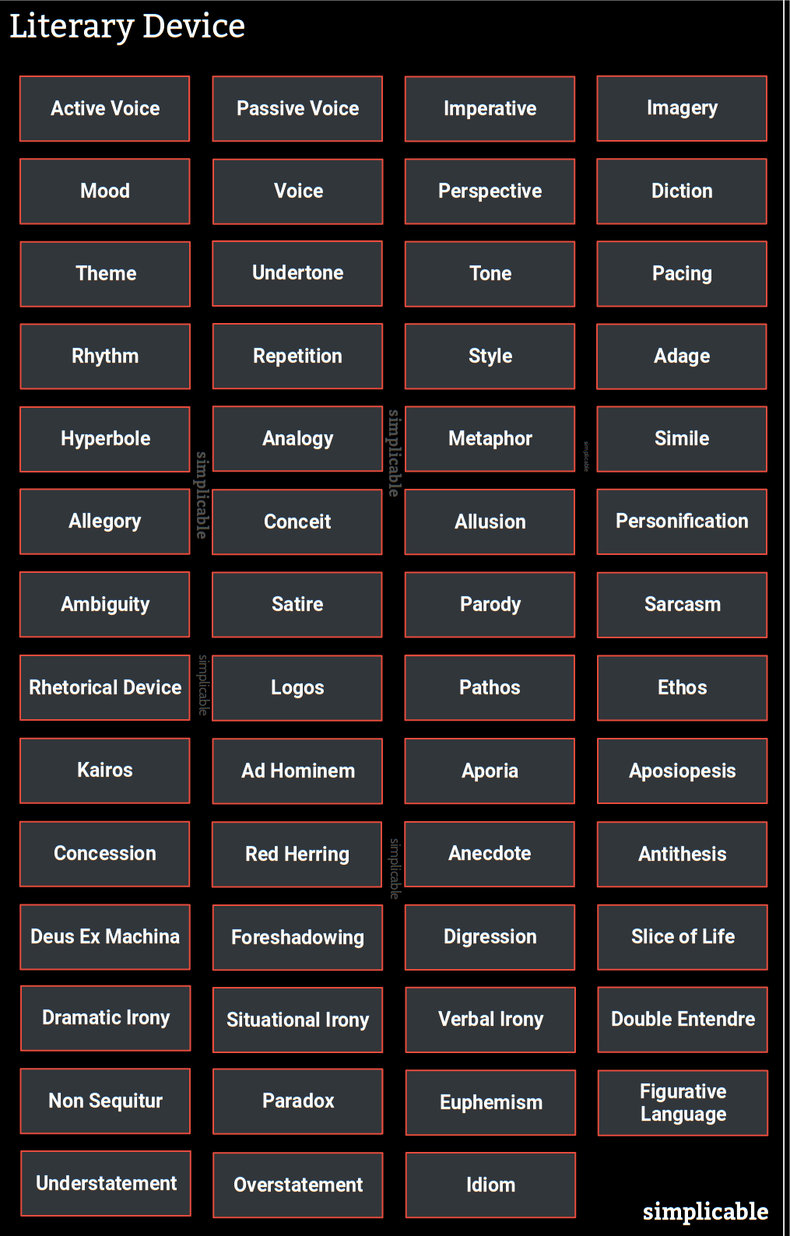
Active Voice
The subject of a sentence performs the action denoted by a verb. For example, "Henry managed the project." This is considered direct, clear and high impact.Passive Voice
In passive voice, what would be the object of an active sentence becomes the subject. For example, "the project was managed" or "the project was managed by Henry." This may be done for a variety of reasons, such as an attempt to avoid blame as in the passive "the car crashed" versus the active "I crashed the car."Imperative
A command such as "let's eat!" This can be used to influence as in a call to action.Imagery
Words designed to invoke the senses including sight, sound, taste, touch and sensation. For example, "the plane groaned through the sky vibrating and popping such that it felt it would come apart at any moment."Mood
The general atmosphere of a story that invokes an emotional picture.I shunned the face of man; all sound of joy or complacency was torture to me; solitude was my only consolation--deep, dark, deathlike solitude.~ Frankenstein, Mary Shelley
Voice
Voice is the style of a writer that shows through in their work with elements such as point of view, humor and choice of words. It is also possible to establish voice by including elements of your personal life in your writing. For example, a journalist who is always including personal anecdotes in their coverage of the news.Which is why I am writing this book. To think. To understand. It just happens to be the way I'm made. I have to write things down to feel I fully comprehend them.~ Norwegian Wood, Haruki Murakami
Perspective
The perspective from which a story is told. This has 3 variations:First Person | Writing from the perspective of the author or main character. But I reckon I got to light out for the Territory ahead of the rest, because Aunt Sally she's going to adopt me and sivilize me, and I can't stand it. I been there before.~ Adventures of Huckleberry Finn, Mark Twain |
Second Person | Writing from the perspective of the reader using "you." Extremely common in non-fiction as a tool of influence. My fellow Americans, ask not what your country can do for you, ask what you can do for your country.~ John F. Kennedy |
Third Person | Writing from the perspective of the subject of a sentence using third-person pronouns such as "he", "she", "they" and "it." Alternatively, third person may omit a subject altogether. A dreamer is one who can only find his way by moonlight, and his punishment is that he sees the dawn before the rest of the world.~ Oscar Wilde |
Diction
A writer's choice of words and style of expression. For example, an academic paper that uses obscure terms in order to evade comprehension and criticism versus a paper that uses the most direct terms possible with an intent to communicate.Theme
The central topics of a work and what the work says about its subjects. For example, a novel that explores the dangers of unbridled individuality and normlessness.Undertone
A non-obvious theme that is so subtle that many readers will miss it or debate whether it exists or not.Tone
The overall approach of writing or speech. For example, a straightforward writer who just gets to the point versus a writer who wraps everything in whimsical stories.Pacing
The speed and rhythm of a story. For example, speeding up delivery in an intense part of a story.Rhythm
Patterns in the structure of your writing. Long sentences are comfortable and easy to read for a long time as they engage the reader in a flow of thought. Short sentence make a point. They are harder to read. However, they command attention.Repetition
Repetition of words or phrases to make a point. Unnecessary repetition that doesn't make a point is just bad writing.The tragedy of old age is not that one is old, but that one is young. ~ Oscar Wilde
Style
Style is everything that makes a writer or speaker unique including their voice, word choice, perspective and use of literary devices. For example, a writer who is known for their humorous metaphors.Adage
A short statement that most people would accept as true such as "war is hell." Also known as an aphorism.Hyperbole
Exaggerating in an extreme way such that any reasonable person wouldn't take what you are saying literally. For example, "I'm so hungry I could eat the moon."Analogy
Analogy is a broad category of literary device that seeks to transfer meaning between starkly different areas such as "your brain is a computer."Metaphor
A type of analogy that directly suggests two things are the same such as "love is war."Simile
A weak analogy that suggests things are the same with cowardly language such as "like" or "resembles." For example, "love is like war."Allegory
An extended metaphor such as an entire book or work of art. Allegories are often non-obvious as they may be ambiguous and complex. For example, the novel Lord of the Flies by William Golding is ostensibly about a group of British boys stranded on a uninhabited island but is considered an allegory of society, civilization the and will to power.Conceit
Conceit is the use of impossibilities that may be appreciated for their creative insights. This can include farfetched metaphors such as Shakespeare's "all the world's a stage."Allusion
A brief and indirect reference to a well known person, place, event or idea. This does not explain the reference and assumes the reader is familiar. For example, "yeah and the Titanic was unsinkable."Personification
Ascribing human characteristics to non-human entities. For example, "the sea is angry."Ambiguity
Ambiguity is a literary device that leaves much to context or interpretation. Generally speaking, explaining things in precise detail that's completely unambiguous is boring. For example, legal text is typically designed to be unambiguous. Reading literature requires the reader to use their imagination and follow a complex structure whereby each sentence can only be understood in the context of the story.Satire
The use of humor, irony, exaggeration or ridicule to criticize. Often considered a protected form of speech, particularly when targeted at fair game such as a celebrity or politician.Parody
A humorous imitation of something or someone. A type of satire.Sarcasm
Insincere words designed to mock or convey contempt. This is often conveyed by tone of voice and attitude in verbal exchanges. Sarcasm has a bad reputation as being bitter, boring and passive aggressive. However, it can be humorous when it is done with a positive intent.I have had a perfectly wonderful evening, but this wasn't it. ~ Groucho Marx
Rhetorical Device
A rhetorical device is an attempt to persuade a reader or audience of something. This has several common variations:The use of logic such as "if the world is flat, why can we sail around it?" | |
An appeal to emotions such as "if we do nothing about global warming it will be our children who pay the price." | |
An appeal to authority such as "Einstein said ..." | |
An appeal to timeliness such as "Everyone is investing in Artificial Intelligence, if we don't advance in this area we will fall behind." | |
Attacking a person as opposed to their argument. For example:A: I think my foot is brokenB: Well, you aren't a doctor are you | |
Aporia | A rhetorically useful expression of doubt such as "why should we invest money in an industry that is dying anyway?" |
Aposiopesis | The use of silence in rhetoric. This can be accomplished in writing by leaving a statement incomplete. For example, "if we do nothing about this problem the likely outcome will be ... well, it is unimaginably terrible." |
Concession | Conceding a point to an opponent in debate to show that you are reasonable, often in an attempt to portray the other side as unreasonable. For example, "I agree coal created good jobs for many generations but now we have to look to future jobs and our competitiveness as a nation." |
An irrelevant argument that serves as a distraction. |
Anecdote
A short amusing or interesting story that may have little to do with your main point. For example, it is common for public speakers to use a funny anecdote to break the ice with an audience.Antithesis
Placing ideas in opposition to each other.That's one small step for man, one giant leap for mankind.~ Neil Armstrong
Deus Ex Machina
A plot device that quickly solves a seemingly impossible problem with the introduction of a new character, event, concept or piece of information. The term deus ex machina has negative connotations and implies a plot resolution that is overly convenient and artificial.Foreshadowing
Giving your audience or reader hints about what is coming. It can be entertaining for an audience to attempt to guess what is coming next. Foreshadowing also makes dramatic plot turns feel less artificial.Digression
Departing from the plot for a while to build interest or suspense. This is often done to give characters depth with some background.Slice of Life
A type of digression that portrays an arbitrary part of a character's regular life such as making a bed or talking to their mother on the phone. A slice of life serves to make a character feel real and can build sympathy for a protagonist.Dramatic Irony
Structuring a work such that the audience knows more than the characters. This allows the character's actions and words to appear to be ironic to the audience without the character being aware of any contractions.Situational Irony
A disparity between a character's intention and results. Often used in comedy.Verbal Irony
A contraction between a statement's intended meaning and its actual effect.Double Entendre
A phase that can be interpreted multiple ways. Often used to talk about risqué topics that would be inappropriate or tasteless to discuss directly. Double entendres are a basic element of comedy and are also commonly used as passive aggressive insults.Groucho: Why do you have so many children?Contestant: Well, because I love children, and I think that’s our purpose here on earth, and I love my husband.Groucho: I love my cigar too, but I take it out of my mouth once in a while.The interaction above is disputed as myth but was documented in a 1976 biography entitled The Secret Word Is Groucho.
Non Sequitur
An abrupt and illogical turn such as a sequence of statements that fail to connect with each other. Often used in humor.Dear Miss Hoover, you have Lyme disease. We miss you. Kevin is biting me. Come back soon. Here's a drawing of a spirokeet. Love Ralph~ Ralph Wiggum, The Simpsons
Paradox
Statements that are impossible or illogical often because they are self-contradictory. Paradox can be used as a way to provoke thought or to produce a humorous effect.I can resist anything but temptation.~ Oscar Wilde
Euphemism
Using highly indirect language to describe something unpleasant such as the hundreds of English euphemisms for drunkenness. These include buckled, gashed and had a few. Euphemisms can be viewed as weasel words if they are used to gloss over the truth.Figurative Language
A broad term for any language that isn't intended to be taken literally.Understatement
Saying less than expected given the context.Ladies and Gentlemen, this is your Captain speaking. We have a small problem. All four engines have stopped. We are doing our damnedest to get them going again. I trust you are not in too much distress.~ Captain Eric Moody on British Airways Flight 9 after the aircraft flew into a cloud of volcanic ash (the flight landed safely after eventually restarting several of the engines).
Overstatement
Expressing things too strongly. This may be done for dramatic effect. In non-fiction, overstatement is often misleading. For example, "the Japanese are conservative" treats Japanese people as if they all think the same and is completely misleading. Overstatement tends to be a poor approach to influencing people as audiences quickly tire of dramatic, stretched and emotional arguments that go too far.Idiom
Phrases that are not to be taken literally. Idioms are are widely understood by speakers of a language and are viewed as part of a language. They can add color to writing and speech as an interesting way to say things. For example, "cut me some slack" means "don't be so critical."| Overview: Literary Device | ||
Type | ||
Definition | A technique that is used in writing or speech to convey meaning and generate emotion. | |
Related Concepts | ||





